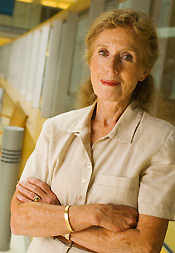
Angela Brodie, of UMB medical school, helped develop a breast cancer treatment.
When Angela Brodie was working in a U.K. hospital more than 30 years ago, surgery was the only treatment for breast cancer.
“I thought, ‘There must be a better way to do this,’ ” said Brodie, a scientist at the University of Maryland, Baltimore’s Marlene and Stewart Greenebaum Cancer Center. “There must be an alternative way to treat breast cancer that is equally effective, if not more effective.”
This thought is what led Brodie to spearhead the development of aromatase inhibitors, the most widely used class of drugs that help prevent recurrence of breast cancer in postmenopausal women by 40 percent, as well as dramatically reducing the need for a mastectomy. Her groundbreaking research earned her an American Association for Cancer Research fellowship at the recently created AACR Academy.
The program recognizes scientists for discoveries that lead to progress in cancer research, said Michael Powell, AACR program administrator.
“We wouldn’t have such high cancer cure rates without a lot of these discoveries,” he said. “We wanted to honor the best scientists in the field for their groundbreaking research and for the amazing things that they have done for the human race.”
The AACR fellowship was created to honor the best scientists in the field of cancer research, as well as to create a brighter future for the AACR Academy by ensuring it’s driven by a team of brilliant cancer researchers, Powell said.
Brodie is one of 106 fellows chosen by the AACR’s directors and officers and inducted April 5 at the AACR Annual Meeting in Washington. Some of the newly inducted members include James Watson, whose research has linked cancer progression to the presence of antioxidants, and Frank McCormick, the Helen Diller Family Comprehensive Cancer Center director.
“Hopefully this will help the academy garner some more awareness and support for cancer research. We want these great minds to get together and maybe even come up with new research areas,” Powell said.
Brodie developed the idea for the breast cancer drugs during her time at a National Institutes of Health training program in Massachusetts, when she and her husband, an organic chemist, began discussing the possibility that reducing estrogen would cut off fuel for the cancer cells. This hormone manipulation would hopefully inhibit the production of aromatase, an enzyme that plays a key role in the production of estrogen.
Once Brodie moved to this state, she found a London college that agreed to test whether the aromatase inhibitors would work as a drug.
It was extremely difficult to get volunteers for the clinical trials, Brodie said, as nothing like the drug had ever been tested before. The trial results proved her theory correct, however, and aromatase inhibitors are now recognized as the best treatment for postmenopausal breast cancer.
“The clinical trial results were very encouraging, and it wasn’t long until companies were developing similar drugs,” Brodie said. “I feel very fortunate that my research has turned out to benefit people.”
Brodie deserves the fellowship, said Dr. Kevin Cullen, director of the University of Maryland Baltimore’s Marlene and Stewart Greenebaum Cancer Center.
“She has contributed more to breast cancer research than anyone in the world has in the last 25 years,” he said. “She made this discovery and developed this drug when people didn’t believe in what she was doing.”
Despite her success, Brodie’s research days are far from over. Her next step is looking into the mechanisms of the aromatase inhibitors, as some women became resistant to them after many years of treatment. Brodie is also working with other scientists to develop an analogous drug to prevent and treat prostate cancer.
“I am hopeful that this will be just as fruitful as her breast cancer research,” Cullen said.



